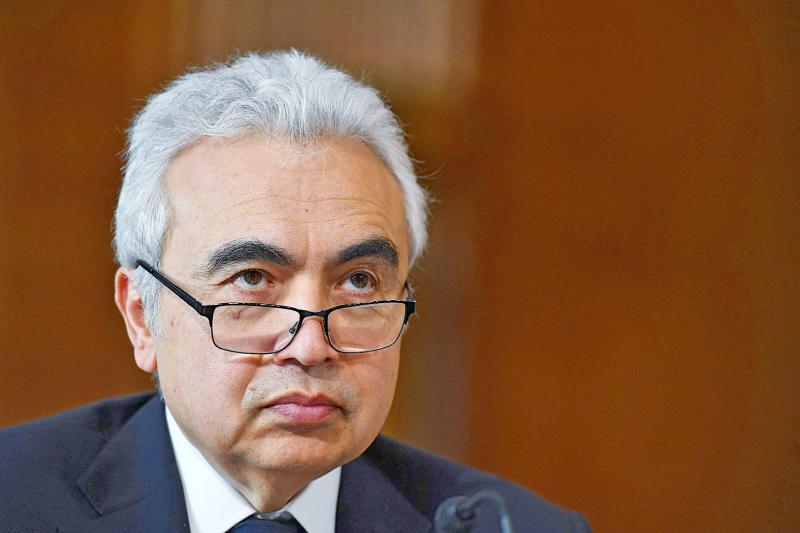A global transition to “clean energy” is still far too slow to meet climate pledges and risks fueling even greater price volatility, the International Energy Agency (IEA) said yesterday.
“We are not investing enough to meet future energy needs and the uncertainties are setting the stage for a volatile period ahead,” IEA executive director Fatih Birol said. “The social and economic benefits of accelerating clean energy transitions are huge, and the costs of inaction are immense.”
In its annual World Energy Outlook report — published just weeks before the COP26 summit in Glasgow, Scotland — the IEA said that investment in clean energy projects and infrastructure would need to be more than trebled over the next decade if those pledges are to be met.

Photo: CNA
The IEA said that renewable sources such as wind and solar energy continued to grow rapidly, and electric vehicles set new sales records last year, even as economies were bent under the weight of COVID-19 lockdowns.
However, “this clean energy progress is still far too slow to put global emissions into sustained decline towards net zero” by 2050,” it said.
The agency analyzed two possible scenarios.
The first looked at the measures governments had already put in place or specific policies they were developing.
Under this scenario, temperatures in 2100 would be 2.6°C higher than pre-industrial levels, it said.
The second looked at promises made by some governments to achieve net-zero emissions, which would see a doubling of clean energy investment and financing over the next decade.
If these pledges were fully implemented in time, global carbon emissions fall by 40 percent by 2050, the IEA said.
Here, the global average temperature increase in 2100 would be about 2.1°C, which would represent an improvement, but would still be way above the 1.5°C agreed under the Paris Agreement, it said.

The US government has signed defense cooperation agreements with Japan and the Philippines to boost the deterrence capabilities of countries in the first island chain, a report by the National Security Bureau (NSB) showed. The main countries on the first island chain include the two nations and Taiwan. The bureau is to present the report at a meeting of the legislature’s Foreign Affairs and National Defense Committee tomorrow. The US military has deployed Typhon missile systems to Japan’s Yamaguchi Prefecture and Zambales province in the Philippines during their joint military exercises. It has also installed NMESIS anti-ship systems in Japan’s Okinawa

‘WIN-WIN’: The Philippines, and central and eastern European countries are important potential drone cooperation partners, Minister of Foreign Affairs Lin Chia-lung said Minister of Foreign Affairs Lin Chia-lung (林佳龍) in an interview published yesterday confirmed that there are joint ventures between Taiwan and Poland in the drone industry. Lin made the remark in an exclusive interview with the Chinese-language Liberty Times (the Taipei Times’ sister paper). The government-backed Taiwan Excellence Drone International Business Opportunities Alliance and the Polish Chamber of Unmanned Systems on Wednesday last week signed a memorandum of understanding in Poland to develop a “non-China” supply chain for drones and work together on key technologies. Asked if Taiwan prioritized Poland among central and eastern European countries in drone collaboration, Lin

NO CONFIDENCE MOTION? The premier said that being toppled by the legislature for defending the Constitution would be a democratic badge of honor for him Premier Cho Jung-tai (卓榮泰) yesterday announced that the Cabinet would not countersign the amendments to the local revenue-sharing law passed by the Legislative Yuan last month. Cho said the decision not to countersign the amendments to the Act Governing the Allocation of Government Revenues and Expenditures (財政收支劃分法) was made in accordance with the Constitution. “The decision aims to safeguard our Constitution,” he said. The Constitution stipulates the president shall, in accordance with law, promulgate laws and issue mandates with the countersignature of the head of the Executive Yuan, or with the countersignatures of both the head of the Executive Yuan and ministers or

CABINET APPROVAL: People seeking assisted reproduction must be assessed to determine whether they would be adequate parents, the planned changes say Proposed amendments to the Assisted Reproduction Act (人工生殖法) advanced yesterday by the Executive Yuan would grant married lesbian couples and single women access to legal assisted reproductive services. The proposed revisions are “based on the fundamental principle of respecting women’s reproductive autonomy,” Cabinet spokesperson Michelle Lee (李慧芝) quoted Vice Premier Cheng Li-chiun (鄭麗君), who presided over a Cabinet meeting earlier yesterday, as saying at the briefing. The draft amendment would be submitted to the legislature for review. The Ministry of Health and Welfare, which proposed the amendments, said that experts on children’s rights, gender equality, law and medicine attended cross-disciplinary meetings, adding that